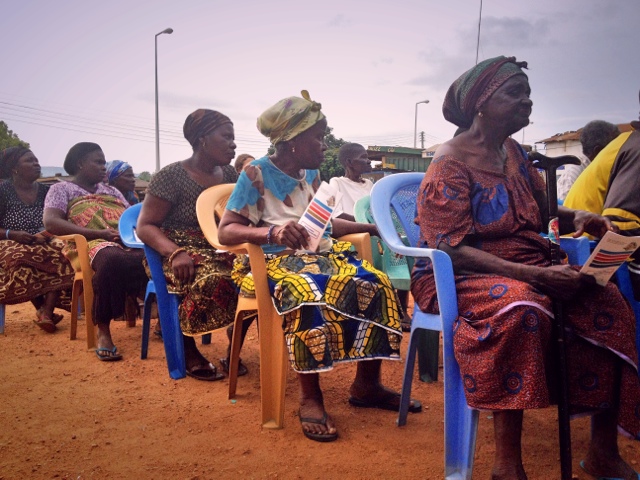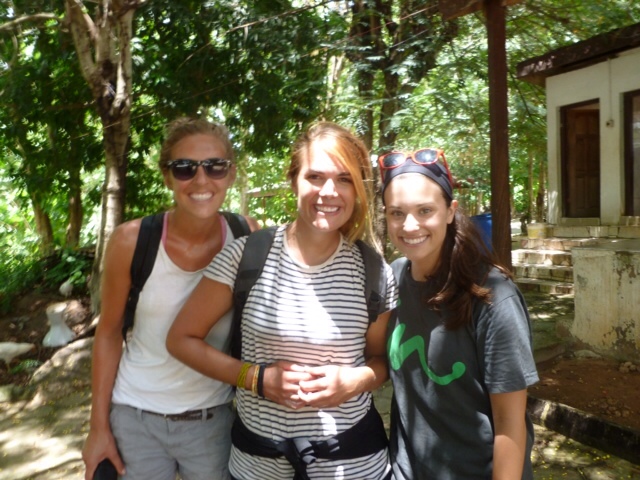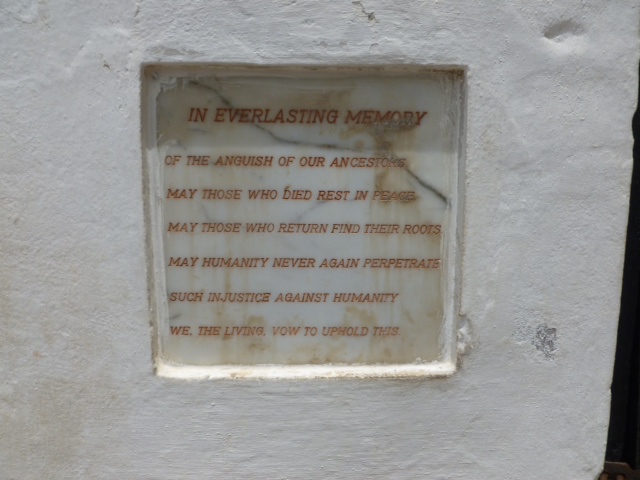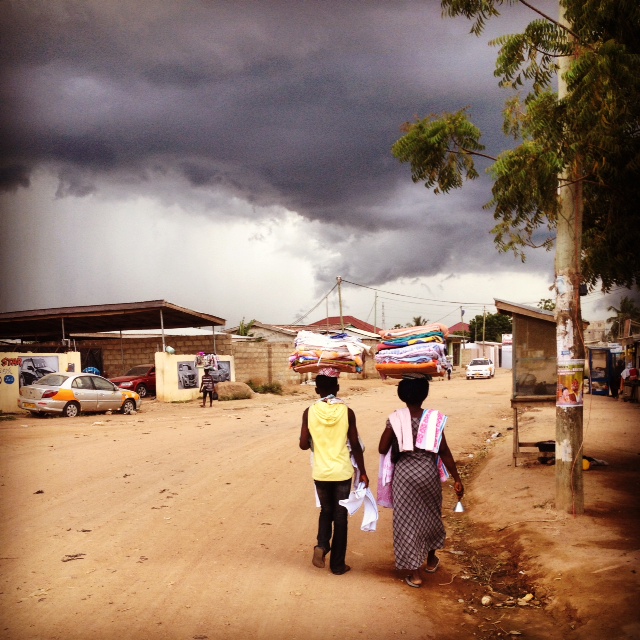Yesterday was the opening day of our tuberculosis screening. In short: successssssssss!
First, the exciting stuff because I don’t want it lost at the end of this post. I’ll rehash the project background afterwards.
Claire and I showed up in Nyanyano, where the screening was held, at 8am. We were going to hold a “dehba,” an event where the community gathers in one area to hear about a specific topic, whether it be health-related, community-related, politics-related, etc. Ours was going to be an educational session about tuberculosis.
After the dehba, we would screen the attendees. We had gathered 6 volunteers who speak Fanti (the local dialect) and they were seated at individual tables where they gave a questionnaire to each person who arrived. The questionnaire determined whether or not the person was a TB suspect. If, based on a points system, they were determined to be suspect, they would be directed to the nurses and a sputum sample would be collected. An hour later they would produce another sample, then be free to leave.
The dehba would start at 9am. We had rented chairs and canopies and started setting up in a vacant lot at “Last Stop,” the well-known last taxi stop on the main road in the town. Earlier that morning and for two days prior, a truck with a public address system had travelled the community announcing the dehba.
At 8:45 oldest woman I have ever seen hobbled up with a cane and plopped into the very first chair, front and center. I handed her a flyer on TB that was translated into all the local Ghanaian dialects, but I’m fairly positive she couldn’t read any. She gave me a toothless smile and nodded her thanks.
More people began to gather at 9. Unfortunately, the volunteer who was supposed to give the educational speech about tuberculosis didn’t arrive. We called and waited and finally decided to delegate the speech to one of the nurses helping with the event, Mary. She did an awesome job and people were very attentive. They were eager to be tested though, so the screening began shortly thereafter.
The initial turnout was fairly low. The sky was gray and clouds threatened to spill. However, people began to gather as the morning went on and soon we were slammed. I was filling out sputum sample labels like a machine for a solid hour or two and didn't even notice a cameraman from TV Africa showed up. There was a reporter snapping photos as the crowd grew.
Soon the rain hit though. Unfortunately it dumped and dumped like it never does in Ghana... Literally the only time it has rained like this in my 7 weeks here.
We had an unfortunate loss to follow up based on the need for people to produce two sputum samples one hour apart. Twenty of the people we obtained a first sample from left and did not return to produce the second. But we had canopies for people to sit under and the majority waited the hour between sample collections.
All in all, it was a major success. We screened 86 people and of those, 53 were considered "suspect" and provided sputum samples to be tested for TB. And this was only day one! We will return to Nyanyano next Monday, Tuesday, and Thursday and will hopefully be able to reach the people who did not provide second samples.
I literally got chills at one point when I realized that odds are, none of these people would ever go to a government clinic and would therefore never be tested if not for our work. Claire and I planned this project from scratch and I'm so proud of our efforts! And we are eternally grateful for the help of the awesome people who were willing to lend their assistance. This is definitely the coolest thing I've ever been a part of. I can't wait to see how next week pans out.
And now, the recap for you fair-weathered blog followers: My other Public Health half Claire and I started this project from the ground up. The NGO we volunteer for, Cheerful Hearts Foundation, was asked by Ghana Health Services to research the level of tuberculosis knowledge of people living in the Central Region of Ghana. Before I arrived in Ghana, Claire played a key role in composing a survey that would be administered through interviews with members of five local communities.
We began the interviews right about the time I showed up. The first community was a fishing village called Nyanyano. We completed 200 surveys.
A little TB background: The government of Ghana recently announced measures to take a serious stand against tuberculosis. All screening and treatment at government-run clinics have been made completely free. Tuberculosis is often fatal if left untreated, but can be prevented with a vaccine and treated with prescribed medication.
So given the seriousness of the disease, one would think negating the financial burden would incite people to be screened. Unfortunately, our survey told us otherwise. We discovered that 78.5% of people interviewed do not go to the doctor for regular checkups: 46% had no identifiable reason, 22% claim to never get sick, and 13% were unaware the screening is free and thought it would be too expensive to go to the doctor.
After interviewing in Nyanyano, we were supposed to move onto the next community. But Claire and I wanted to do something for the people we had just spent weeks surveying. The aforementioned numbers bothered us, and we didn't want to leave them as just statistics. We wanted to change them, and so started researching how to bring a screening to the community.
We met Eunice, an administrator at the Nyanyano Health Clinic. She introduced us to her team of nurses and a community volunteer who all work specifically with TB. Nurse Eunice (different than Administrator Eunice), Gifty, Mary, and Esther joined our efforts.
The Nyanyano Health Clinic doesn’t have the appropriate lab facilities to screen for TB, so we contacted clinics in nearby towns. Claire and I approached administrators at the Kasoa Polyclinic and at St. Gregory’s Hospital, located in the nearby Liberian Refugee Camp. Both seemed intimidated by our requests for assistance, so we looked into other lab options.
We were introduced by chance to Dr. Samuel Kudzawu, a local man who studied at and now works at the Korle Bu teaching hospital in Accra. He lost his sister to TB and both his father and brother had the disease, and he made it his life work to research and treat TB in Ghana. He and his assistant Tony run an independent lab in the Liberian Refugee Camp and were thrilled to take on all of our samples to test.
We held several meetings with all the key players over 2-3 weeks. The costs of the screening were minimal - roughly 200 cedes ($75 US) thanks to the government assistance in providing materials for screening and treatment. Finally it all came together yesterday and I couldn't be more thrilled. Our efforts paid off!
Stand by for final numbers, TBA after our full screening. Thank you for all the prayers and support!


































